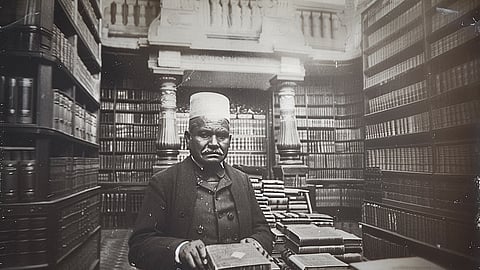- Commentary
- History Vignettes
- Notes on Culture
- Dispatches
- Podcasts
- Indian LanguagesIndian Languages
- Support

PARASHURAM KRISHNA GODE stands unrivalled as a resplendent star in the luminous galaxy of the stalwarts of the New Indian Renaissance for blazing a trail of unique distinction. Even the luminaries with whom he rubbed shoulders did not traverse this virgin road. It was an ancient road that had fallen into sorry disrepair. P.K. Gode not only rediscovered it through happenstance but cleared the thorns and debris and smoothened it for posterity by the sheer dint of his untiring labour and unwavering focus. The outcome was an extraordinary literary corpus of 475 top-rated, invaluable scholarly papers running into 3500 pages spread over seven volumes. It was the tapas of a lifetime. And more. In a profound sense, only a savant of his temperament could have accomplished it.
To offer just the appetiser of the singularity and flavour of his scholarly penance, here is a list of his papers culled out randomly:
1. A Manuscript of Rasasindhu: A Rare Work on Alchemy and its Probable Date
2. Texts Sanctioning the study of Yoga by Women and their Chronology
3. The Snake-charmer (The Simile of Garudika as applied to the Yogi by Ramakantha in his Commentary on the Bhagavad-gita)
4. Beliefs about the power of Mustard-Seed to ward off Evil
5. Some Contemporary Evidence regarding the Asvamedha Sacrifice performed by Sevai Jayasing of Amber
6. The Antiquity of the Caste-Name “ Senvi”
7. Identification of historical and Geographical Names in the Laksmanotsava, a Medical Treatise
8. Identification of Raiiga Jyotirvid, the author of Vicarasudha- kara, a Medical Treatise
9. Keshavbhat Karve, a Poona Banker of the Peshwa period and his Relations with the Peshwa and Damaji Gaikwad
10. Antiquity of the Lost Medical Treatise by Kharanadi in the light of the Leaf of the Kharanada-Nyasa newly discovered at Gilgit
11. The Hindu Nose- Ornament, its Past and Present
12. Studies in the History of Indian Cosmetics and Perfumery
13. Antiquity of some IconographicVerses about the Mahalaksmi of Kolhapur occurring in Works on Architecture — Before A. D. 1200
14. The Tradition about the Liaison of Jagannatha Panditaraja with a Muslim lady (Yavani)—Is it a Myth?
15. Sabdasiddhantacandra, an Unknown Work on Grammar by Samkara, son of Giridhar
More than six decades after P.K. Gode attained immortality, it is a profound misfortune that almost nobody in the realm of Hindu cultural studies has chosen to nurture the scholarly foliage that he so assiduously planted and nourished. In his own time, Gode repeatedly expressed his indefatigable optimism about a promising future for scholarship in these topics. When we read it today, we lapse into mourning.
THE STORY OF PARASHURAM KRISHNA GODE begins with the defeat of the formidable Maratha Grand Admiral, Tulaji Angre, son of the indomitable Kanhoji Angre. When Tulaji Angre shot into prominence in the latter part of the 1730s, the sprawling Maratha Empire resembled a confederation of warring factions loosely fused by political chicanery and competing self-interests.
Tulaji, who was patronised by Maharaja Shahu I, quickly became a menace. He had the men, money and muscle to enforce his menace. As the ruler of the Colaba State, Tulaji began launching a series of predatory raids on both land and sea against the British and Maratha feudatories.
By 1753, the all-powerful Peshwa Balaji Baji Rao had resolved to punish Tulaji and in the decisive Battle of Vijaydurg in 1756, he was defeated, arrested and imprisoned for life. It was an unfortunate fate that befell this hot-headed son of Kanhoji Angre, one of the greatest naval commanders in world history.
But almost a decade before he had infuriated Balaji Baji Rao, Tulaji had earned the ire of other chieftains in the Maratha Empire. With Vijaydurg as his base, Tulaji incessantly raided the territories of four powerful chieftains of the Maratha Empire — the Pratinidhi of Vishalgad, the Pant Amatya of Bawada, Vadikar Sawant and Apaji Angre. Apaji was Tulaji’s own brother. The quartet eventually united and decided to teach Tulaji a lesson he’d never forget. Correspondence flowed thick and fast among the four and an unanimous decision was reached. Tulaji Angre would be besieged by the combined troops of the four chieftains and brought to heel.
The Pratinidhi of Vishalgad, Gangadhar Krishna called for a strategy meeting in his court. Eminent people from all Varnas and professions were invited. Gangadhar sought their counsel but nobody was forthcoming. After a long time, a confident voice rang out in that assembly: “If I receive orders from the esteemed Pratinidhi, I will collect 5000 troops and expel Tulaji Angre’s men.”
The voice belonged to Nāro Rāyāji Goḍe Thākur Kārakūn. The founder of P.K. Gode’s lineage.
In a brilliant historical investigation into the Battle of Muḍāgaḍ, P.K. Gode narrates the story of his ancestry in the January 1937 issue of the Journal of the University of Bombay in an essay titled Studies in the History of the Angrias. Spread over 25 pages, the essay is a fine model reflecting the best traditions of historical scholarship of that era.
This is how P.K. Gode describes the origins of Nāro Rāyāji Goḍe:
"The eldest son Nāro Rāyāji…at the age of seventeen owing to poverty at home…left home without his father’s permission in search of some employment and arrived at Vishalgad with Brahmins who went there for the Navaratra Festival. After the festival was over he requested Shrimant Krishnarao Appa Pratinidhi that he should be given some employment. Thereupon Krishnarao, being pleased with his fine handwriting agreed to employ him on Rs. 100 as (annual) remuneration."
What happened next will be narrated in the forthcoming episode of this series.
To be continued
The Dharma Dispatch is now available on Telegram! For original and insightful narratives on Indian Culture and History, subscribe to us on Telegram.
